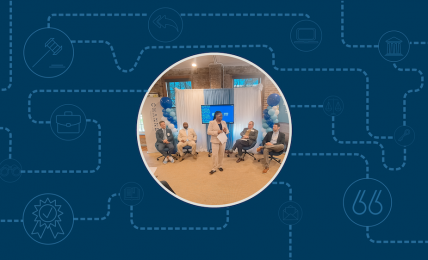
For 25 years, UNC School of Law’s Externship Program has bridged the gap between legal theory and practice. Maria Savasta-Kennedy, George R. Ward Term Professor and director of the externship program has witnessed significant growth since its inception during the 2000 academic year. “When we began, there were about 30 students working with a variety of sites,” she shared. “Over the years, we’ve grown to about 130 partner sites and now have a vast array of opportunities – from state and federal judges to in-house counsel for corporations like Aston Martin and NASCAR, to numerous public interest organizations and state and federal agencies.”
Today, the program places up to 65 students each semester in positions ranging from 10 to 20 hours weekly for three to six credits. Select students also participate in full-time, 12-credit externships in cities like Washington, D.C., New York, Atlanta, and Charlotte. Recognizing the financial challenges of these placements, the school has established the Semester in Practice Fund to provide living expense stipends.
Program Coordinator Melissa Wood-Saltzman describes the program as “built to mentor students in learning practical skills in the environment they’ll be working in.” Savasta-Kennedy adds that “an externship provides a kind of ‘dress rehearsal’ helping students identify possible career paths… They learn what it means to practice law in a particular setting, the types of cases they’d work on, how they would spend their day in terms of court time, client time, meetings, etc., and the quality of life of this type of lawyer.”
To gain insight into the program’s impact, Carolina Law spoke with summer externs about their experiences.

Jeff Guinn, Class of 2026, Cumberland County District Attorney’s Office
What motivated you to pursue an externship, and how did you decide where to apply?
Initially, I was focused on pursuing an internship for the entire summer, but after meeting with Wood-Saltzman and learning about all the benefits that an externship provided I immediately re-evaluated my decision and requested to be part of the program. What drew me to re-evaluate my decision was the guarantee of structured mentorship that came with the externship through Professor Janine Zanin, Clinical Professor of Law and Assistant Director of the Externship Program, rather than the unknown of whether an internship would provide any meaningful mentorship or guidance. This isn’t to suggest that I didn’t receive excellent mentorship from my externship site, because I most certainly did.
I didn’t go through the traditional application process for the Externship Program. Being a non-traditional law student, I leaned heavily on my prior career and began soliciting positions in areas that interested me by cold-calling and sending my resume to many organizations. I started doing this midway through the fall semester of 1L, and by the end of that semester, I had received a few oral offers for the summer. This was all before shifting from an internship to the Externship Program, so when I decided that the Cumberland County District Attorney’s Office was the right fit for me, I simply coordinated with Wood-Saltzman for placement.
Can you share something you’ve learned during your externship that has surprised you or changed your perspective on legal practice?
I’d say that the most surprising aspect of my externship experience was how cordial Cumberland County’s bar was. I anticipated much more of an adversarial and hostile environment between prosecutors and defense attorneys, but what I learned was that each side—I am only speaking to my experience in Cumberland County—was truly working to further what was in the best interest of justice. There wasn’t a single moment over the course of my externship where I walked away from a trial, or a plea, feeling like a defendant had been aggressively over-prosecuted, or a victim hadn’t received justice for a crime that had been perpetrated against them—jury trials notwithstanding. Each side worked with one another, and it was quite amazing to participate in the process.
How has your externship experience influenced your career goals or what you ultimately want to do after graduating?
Simply put: this externship experience solidified my pre-conceived desires to go into a prosecutorial role. Having a third-year practice letter allowed me to fully experience the daily life as a prosecutor—ranging from negotiating and adjudicating pleas, trying multiple bench trials in District Court, running my own court room, and second chairing both a first-degree murder trial and a second-degree kidnapping/assault on a female trial in Superior Court. This experience through the Externship Program confirmed my passion for prosecutorial work and opened my eyes to the vast impact that prosecutors have on their community. It also granted me hands on experience regarding the discretion prosecutors have in what constitutes whether something is truly in the best interest of justice, from the perspective of both a defendant and victim.
How has Carolina Law prepared you for your externship?
The consistent contact and feedback provided by Zanin throughout the externship were critical in helping navigate the ins and outs of real-world prosecutorial work. Being part of the Externship Program granted me the unique opportunity to learn from two pots of knowledge at the same time—a very skilled and knowledgeable professor (Zanin) and through the excellent mentorship from the Cumberland County assistant district attorneys I worked with. Without participating in the Externship Program, I would not have had this opportunity.
What advice would you give students considering participating in the Externship Program?
Don’t hesitate; choose the Externship Program. The experience you will have, and the knowledge you will gain through the program will far surpass anything you will get from just doing an internship. You will be a better lawyer and version of yourself in the future because of it.
Arden Riddle, Class of 2026, Cypress Sports

What motivated you to pursue an externship, and how did you decide where to apply?
My sister attended Carolina Law and participated in the Externship Program. Hearing about her externship and the insights she gained helped me understand the value of diverse experiences and the importance of networking. Her advice on how to navigate the externship application process and make the most of the experience was invaluable. My sister’s positive experiences also reinforced my belief in the importance of hands-on learning and the benefits of engaging with different legal environments. I am very interested in sports law and was eager to pursue an externship in that field if the opportunity presented itself.
Can you share something you’ve learned during your externship that has surprised you or changed your perspective on legal practice?
During my externship with Cypress Sports, I was surprised by how policy-driven the field is. I initially expected the work to focus more on contract negotiations and legal disputes, but I found that a significant portion of the practice involves shaping and interpreting complex policies that govern the sports industry. This experience has changed my perspective on the role of legal practitioners in sports law, highlighting the importance of understanding and influencing the regulatory environment.
How has your externship experience influenced your career goals or what you ultimately want to do after graduating?
My externship experience exposed me to various aspects of sports law, but given the short duration, I am still exploring how this fits into my long-term plans. While I gained valuable insights, I am still considering whether to specialize in sports law or explore other areas of legal practice. The externship has affirmed the importance of gaining diverse experiences to refine my career direction.
How has Carolina Law prepared you for your externship?
Carolina Law has prepared me for my externship by providing a solid foundation in legal theory and practical skills. The courses in the 1L curriculum equipped me with the tools needed to tackle real-world legal problems. The school’s emphasis on practical experience and its supportive faculty have been instrumental in building my confidence and competence in the field.
What advice would you give students considering participating in the Externship Program?
My advice for students considering the Externship Program is to be open to new experiences and be proactive in seeking opportunities to learn. Engage with your mentors, ask questions, and take on diverse assignments to gain a broad perspective. Also, make sure to reflect on your experiences regularly to understand how they align with your career aspirations and interests.
Vaishnavi Muruganandam, Class of 2026, National Public Radio

What motivated you to pursue an externship, and how did you decide where to apply?
I wasn’t explicitly pursuing an externship for the summer. Instead, I was looking for an opportunity that I was passionate about. I’m interested in soft-IP and media law, so National Public Radio was a perfect fit for me. Trying to get an IP-focused summer opportunity was difficult for me as most positions were looking for people with a STEM background, which I don’t have. I was extremely grateful to get exposure to intellectual property in this way, as well as a host of other different practices that in-house counsel regularly deals with.
Can you share something you’ve learned during your externship that has surprised you or changed your perspective on legal practice?
One of the most important skills I was introduced to was communicating legal issues to non-lawyers. For example, journalists have a particular perspective on their writing—they want to keep their wording and language to communicate with the audience. However, lawyers are concerned about potentially libelous statements and are determining the risk of certain statements. Navigating this was eye-opening to me.
How has your externship experience influenced your career goals or what you ultimately want to do after graduating?
One of the experiences that influenced me was sitting in on meetings with outside counsel. I was aware that law firms work with in-house counsel regularly, but I hadn’t imagined the perspective of in-house counsel during those conversations. This made me more appreciative of in-house counsel as a career path and influenced how I would approach these kinds of clients in a law firm setting.
How has Carolina Law prepared you for your externship?
Explicitly identifying what skills I wanted to work on through the externship program and communicating that to my supervisor was really helpful. I told my supervisor I wanted to work on my oral communication skills and networking, so he changed the structure of our meetings, and we worked to prioritize meeting with every single attorney on the general counsel team, which was one of the best parts of my externship.
What advice would you give students considering participating in the Externship Program?
If there is an externship unaffiliated with the Carolina Law externship program you are interested in, it is simple to make it work with the Externship Program. Just be sure to communicate with the professor and the registrar to make sure everything is in order. I especially want to express my thanks to Professor Rina Lyubkin for working with me to make the program fit with my externship and Wood-Saltzman for helping me with some of the administrative tasks in registering for the program.
Also, the most fruitful part of my externship experience was networking. It has led to other future opportunities, which I am extremely grateful for.



